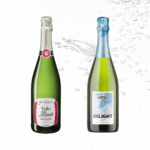Quelle est la différence entre le Crémant et la Clairette de Die ?
Découvrez les différences qui font la richesse du Crémant et de la Clairette de Die, deux joyaux de la tradition vinicole du terroir français.
À travers leur élaboration, leurs profils aromatiques et leurs conseils de dégustation, les experts de Jaillance vous livrent les secrets de ces deux vins effervescents produits au sein de la Maison.
À la découverte du Crémant
de Jaillance
Chez Jaillance, vous retrouverez trois types de Crémants : fabriqués respectivement à Die, Bordeaux et en Loire. Our Crémant de Die est élaboré à partir des cépages Clairette Blanche, Aligoté et Muscat pour lui conférer un arôme fruité et de fleurs blanches.
Quant à notre Crémant de Loire, il est composé à majorité du cépage Chenin, où se rajoutent les cépages Chardonnay, Cabernet Franc et Grolleau, qui permettent d’en faire un vin léger, délicat et fin. Le Crémant de Bordeaux est produit dans les caves Brouette-Jaillance avec un assemblage des cépages Sémillon et Cabernet Franc qui lui confèrent de belles notes de fruits blanc au nez et une belle vivacité en bouche.
La Clairette de Die
Visit Clairette de Die est un vin mousseux doux, produit dans les vignobles du Diois, au cœur de la Drôme. Elle est célèbre pour sa méthode de fabrication ancestrale et ses saveurs uniques, souvent dominées par des notes de fleurs blanches, de fruits exotiques et d’agrumes.
La production de Clairette de Die remonte à l’Antiquité, faisant d’elle l’un des plus anciens vins de France. Sa méthode de production unique a été transmise à travers les générations, restant fidèle à ses origines.
Les cépages entrant dans la composition de la Clairette de Die, comme son nom l’indique, sont en majorité la Clairette Blanche, ainsi que le Muscat, qui confèrent au vin son équilibre parfait entre douceur et fraîcheur.
Chez Jaillance, vous retrouverez plusieurs cuvées de Clairette de Die, allant d’une fine bulle faiblement alcoolisée avec le Jay’up, à une Clairette biologique ou simplement notre cuvée traditionnelle.
Les principales différences entre le Crémant et la Clairette de Die
Un procédé unique de fabrication
Visit Clairette de Die et le Crémant sont deux vins effervescents avec une vinification similaire puisqu’ils subissent deux fermentations, une en cuve et l’autre en bouteille.
Cependant, la vinification de la Clairette de Die est légèrement différente de celle du Crémant car elle est issue de la méthode ancestrale dioise.
C’est une méthode qui permet de mieux conserver la naturalité du vin en préservant la fraîcheur des raisins. La première fermentation du vin est incomplète, car elle s’effectue sans ajout de levure ni de liqueur, le processus se poursuivra donc en bouteille lors de la seconde fermentation uniquement grâce au sucre résiduel du raisin.
Profils aromatiques et gustatifs
Le Crémant peut avoir des notes différentes à la dégustation selon son terroir de provenance. Par exemple, notre Crémant de Bordeaux Blanc de Noirs offre des arômes de fruits jaunes mûrs et de fruits blanc, tandis que le Crémant de Die Jaillance vous offrira des notes de pommes et de fruits verts.
Quant à la Clairette de Die, c’est un vin effervescent doux et frais avec des arômes frais et fruités, dominés par des notes de fruits à chair blanche, de litchi, de rose, et parfois de miel.
Pour résumer simplement, la Clairette de Die offre un aspect doux, fruité et sucré tandis que le Crémant, quelle que soit son origine, sera la plupart du temps plus sec et minéral.
Conseils de dégustation
Pour savourer un Crémant dans les meilleures conditions, il convient de le servir frais, aux alentours de 6 à 8 degrés. Cette température va permettre de révéler ses arômes les plus subtils tout en gardant une bonne effervescence.
Grâce à la diversité aromatique des Crémants, vous pouvez tout à fait les déguster avec des fruits de mer, des viandes blanches, des fromages à pâtes dures, ou tout simplement en apéritif.
Visit Clairette de Die Tradition de Jaillance doit être généralement servie autour des 5 degrés pour préserver au maximum sa richesse aromatique.
Pour la dégustation, la Clairette de Die peut se prendre en apéritif, mais s’associe généralement bien avec les desserts de type tartes aux fruits ou sorbets, ou même avec des plats épicés et des fromages bleus où sa douceur viendra équilibrer les saveurs.
Pour en savoir plus sur l’univers de la Clairette de Die de Jaillance, visitez notre page dédiée “Tout savoir sur la Clairette de Die”.
